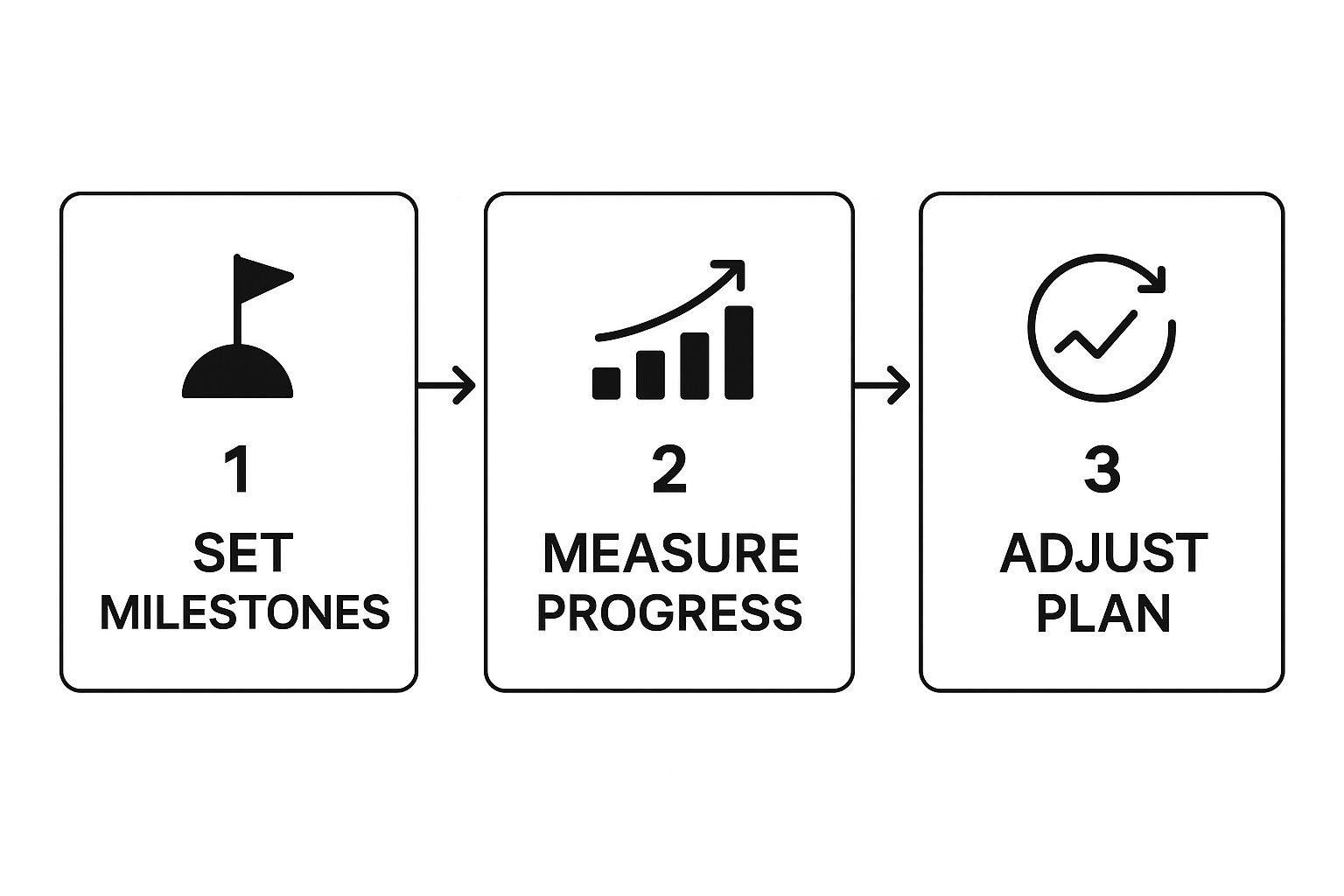Your Career Development Planner for Success
- Talent People

- Aug 24, 2025
- 13 min read
Think of a career development planner as your personal, professional roadmap. It's not just another to-do list; it’s a living document that maps out your biggest ambitions, pinpoints the skills you'll need to get there, and sets out clear, achievable milestones along the way.
Why a Career Planner Is Your Secret Weapon

It’s easy to feel like you're just drifting in your career, letting things happen to you rather than making them happen. That's a pretty common feeling. But in a world where job roles and in-demand skills are constantly changing, being proactive isn't just a nice-to-have—it's essential. A career development planner is what helps you shift from simply reacting to whatever comes next to actually writing your own professional story.
This kind of structured thinking gives you the clarity to spot opportunities you might otherwise miss, get ahead of what your industry will demand next, and truly take the reins of your career path.
From Ambition to Actionable Plan
Let's take a real-world example. Imagine a marketing professional who feels like their career has hit a ceiling. They have a fuzzy goal of moving into a leadership role someday, but no real clue how to make that a reality. This is exactly where a career planner becomes a game-changer.
Instead of just hoping for a promotion, they can use the planner to break that big ambition down into smaller, concrete steps.
Looking at their planner, they might realise they have gaps in data analytics and team management. Suddenly, they have a clear path forward with actionable goals:
Enrol in a certified data analytics course within the next three months.
Put their hand up to lead a small internal project to build management experience.
Find a mentor who is already a marketing director.
Just like that, a distant dream turns into a series of manageable, immediate actions.
By writing down your goals and the steps to reach them, you're making a real commitment to yourself. The act of putting it on paper clarifies your thoughts and gives you something to look back on for motivation when you need it.
The UK labour market is always shifting, and you need a sense of purpose to navigate it successfully. Recent figures show the employment rate for those aged 16 to 64 was 75.1%, up by 562,000 people over the year, which points to a recovering workforce. In a competitive field, a clear plan helps you stand out and intentionally build the skills that employers are desperate for. You can find more UK labour market trends from the Institute for Employment Studies to see what's happening.
Laying the Groundwork for Your Plan

Before you can map out where you’re going, you have to get real about where you are right now. A meaningful career plan isn't built on wishful thinking; it's grounded in honest self-awareness. This is the crucial first step: a deep dive into what makes you tick professionally.
Forget those vague questions about "finding your passion." Let's get practical. Think about your current job or past roles. When did you feel most energised? What specific tasks made you feel completely in your element? Pinpointing those moments helps you uncover your core strengths and motivators—the things you should be doing more of.
Conducting a Personal SWOT Analysis
One of the most powerful tools I've seen for this kind of self-discovery is a personal SWOT analysis. It’s a simple framework that forces you to look at your career from four different angles: Strengths, Weaknesses, Opportunities, and Threats.
The key is to be brutally honest. A 'weakness' isn't a character flaw; it’s a skill gap you can close. Maybe you freeze up when presenting to senior leaders or you haven't quite got your head around a new piece of software. That’s not a failure—it’s an area primed for development.
Likewise, an 'opportunity' could be a new trend taking hold in your industry. If you’re a software developer, the rise of AI is a massive opportunity to learn new skills that companies are desperate for. This kind of detailed thinking turns the SWOT from a box-ticking exercise into a genuinely strategic part of your career plan.
A personal SWOT analysis isn't about judging yourself. It’s a strategic tool for gaining clarity. It helps you see where you can invest your energy for the greatest return and where you need to build defences against potential career roadblocks.
This process of assessing your personal "workforce" mirrors how companies approach strategic planning. They have to know what skills they have before they can build for the future. If you want to see how this works on a larger scale, our essential workforce planning template and guide offers a great perspective.
To get started, here's a simple way to structure your own SWOT analysis.
SWOT Analysis for Career Planning
A personal SWOT is a fantastic way to organise your thoughts and identify clear action points. Use the questions below as a starting point to reflect on your current professional standing and future potential.
Category | Guiding Question | Example (For a Software Developer) |
|---|---|---|
Strengths | What do you do better than anyone else? What unique skills or knowledge do you have? | I’m highly proficient in Python and have a knack for debugging complex code quickly. |
Weaknesses | Where do you have room to improve? What skills are you lacking for your next desired role? | My public speaking skills are weak, which holds me back from leading client demos. |
Opportunities | What industry trends can you take advantage of? Is there a need in your company you can fill? | My company is moving towards cloud-native applications, and there’s a shortage of experts. |
Threats | What obstacles are in your way? Are any of your skills becoming outdated? | The rise of no-code platforms could devalue some of my basic front-end skills over time. |
Completing this gives you the raw material you need to build a targeted and effective career development plan.
Crafting Your Personal Mission Statement
After digging into your drivers and completing your SWOT, the final piece of foundational work is to pull it all together. You need to distil everything you've learned into a short, sharp personal mission statement. This statement will act as your guidepost for every decision in your career plan.
Think of it as your professional North Star. It should be a clear, compelling sentence or two that sums up your purpose and direction.
Here are a couple of examples to show you what I mean:
For a Project Manager: "To lead innovative renewable energy projects that make a measurable environmental impact, using my skills in team collaboration and strategic execution."
For an HR Professional: "To build inclusive and high-performing teams by connecting talented individuals with opportunities where they can thrive and grow."
This isn't just a feel-good exercise. When you’re faced with a choice—whether to join a project, take a course, or go for a promotion—you can hold it up against your mission statement. If it aligns, you know it’s a step in the right direction.
Setting Goals That Actually Motivate You

The goals you put in your career planner are its engine. But they can't be just vague wishes or buzzwords copied from a corporate handbook. For goals to actually work, you need to feel genuinely excited about chasing them. It's about moving past the 'tick-box' mentality and setting objectives that really mean something to you.
First, think big. What's your "vision" goal? This is the destination you're steering towards, that compelling future you want to create for yourself. It needs to be ambitious but still believable. For instance, "get promoted" is fine, but it lacks spark. A much stronger vision would be, "Transition into a UX Design Lead role within the next two years." That simple shift gives you a clear direction and a story to build on.
Breaking Down Your Vision Into Actionable Steps
With a clear vision in place, it's time to get practical. A two-year goal can feel a bit daunting on a Monday morning, so the trick is to break it down into smaller, more manageable milestones. Think in quarters. This simple act connects your long-term ambition to what you need to do right now.
Let's go back to our aspiring UX Design Lead. Their quarterly milestones might look something like this:
Quarter 1: Complete that advanced Figma prototyping course I've had my eye on to really nail interactive design.
Quarter 2: Put my hand up to lead the design review for a small internal project. It’s a great, low-risk way to build some leadership experience.
Quarter 3: Create a killer case study from a recent project and get it into my portfolio.
Quarter 4: Line up three informational chats with current UX leads to get a real feel for the role's challenges.
This strategy works no matter what you do. A nurse aiming for a specialisation could set a milestone to shadow a senior practitioner. A salesperson looking to crack a new market might aim to secure five meetings with key prospects. The key is that every milestone is a concrete action, tied directly to a skill you need or an outcome you're after.
The real magic of a career development planner is how it connects a huge ambition to a small, immediate task. It turns overwhelming goals into a series of achievable wins, which builds momentum and keeps you fired up.
Balancing Outcomes with Processes
It’s easy to get fixated on hitting big targets, but not all goals should be about the finish line. It's just as important to build the habits that lead to success over the long haul. These are what I call process-based goals—they're all about consistent effort, not a final result. Weaving these into your planner ensures you're always growing, even between the big wins.
A fantastic process-based goal for our UX designer could be, "Spend one hour every Friday morning reading industry case studies and trend reports." It’s a simple, repeatable action that builds deep expertise over time. Someone in finance might decide to "Dedicate 30 minutes each Monday to networking on LinkedIn." These are the small, consistent actions that lay the foundation for your next big career move.
How to Map Your Skills and Find the Gaps
If your goals are the destination, your skills are the engine that gets you there. This is where your career development planner stops being an abstract idea and turns into a practical, step-by-step roadmap. The first thing to do is get a clear, honest picture of your current capabilities.
Start by making a simple list of everything you're good at in a professional sense. Now is not the time to be modest. Jot down the skills you lean on every day, the strengths your manager highlights in reviews, and even the tasks you genuinely enjoy. This list is your starting point—the foundation of your skills map.
Identifying Your Target Skills
Once you've got a handle on where you stand today, it's time to look ahead. What skills will you need for that next role you're aiming for? This isn't about guesswork; it's about doing a bit of research.
Dive into job descriptions on platforms like LinkedIn for the kind of positions you want. Look for patterns. What specific software, abilities, or qualifications keep popping up? Industry reports and professional networks are also fantastic resources for understanding which skills are gaining value in your field. Pay close attention to the exact language they use—it's the key to spotting your gaps with real precision.
Categorise and Rate Your Abilities
To make your lists more manageable, start grouping your skills into logical buckets. This simple act can instantly highlight where you're strong and where you need to focus. Common categories often include:
Technical Skills: Things like proficiency in specific software, coding languages, or operating certain equipment.
Soft Skills: Your ability to communicate, work in a team, solve problems, and lead with empathy.
Leadership Skills: Experience with project management, mentoring others, strategic thinking, and making tough decisions.
With your skills categorised, rate your proficiency in each one. A simple scale like 'Beginner,' 'Intermediate,' or 'Expert' is perfect. This isn't about being hard on yourself; it’s about creating an accurate map to guide your development. This personal exercise is actually a micro version of what companies do. To see how this plays out on a larger scale, our guide on what talent mapping is and why it's key offers some great context.
The real magic happens when you pinpoint your most critical skill gaps. For example, if you're a marketing specialist aiming for a project manager role, your development need isn't just a vague notion of 'leadership.' It's more likely specific, tangible abilities like risk assessment, budget management, or stakeholder communication. Nailing these specifics turns a wish into a concrete plan.
Your biggest opportunities for growth live in the space between the skills you have and the skills you need. Pinpointing these gaps with accuracy is the single most important step in building a career plan that actually works.
Understanding the job market adds a layer of reality to this process. The UK has seen job vacancies fluctuate, with around 781,000 openings recorded in March 2025. While economic uncertainty has made some sectors more cautious, fields like health and social work continue to grow, proving that specific skill sets will always be in demand. Mapping your skills ensures you’re developing what employers are actively looking for.
This flow chart breaks down how to put your plan into action by setting clear milestones, measuring your progress, and making adjustments along the way.

As you can see, a career plan isn't a static document you file away. It's a living, breathing cycle of planning, doing, and reviewing.
Keeping Your Career Plan Alive and Working
So you've created a brilliant career development plan. That's a fantastic start, but the real work begins now. A plan gathering dust in a drawer isn't going to get you anywhere; it has to be a living, breathing document that shapes your decisions week in and week out.
The secret isn't some fancy app or a complicated spreadsheet. It’s simply about building a solid habit of checking in with yourself. Think of it this way: you wouldn't run a major project at work without regular reviews, right? Your career is the most important project you’ll ever manage, so treat it with the same respect. Get those reviews in your calendar.
Find Your Review Rhythm
Consistency is what separates a wish from a plan. Setting up a regular schedule to look over your planner makes your goals a real, tangible part of your routine. This doesn't need to eat up your entire weekend, but it does need to be intentional.
A rhythm that works wonders for many people is:
Monthly Check-ins: Set aside 30 minutes each month to see how you're tracking against your short-term goals. Did you finish that online course module? Did you finally have that coffee with a new contact? These quick check-ins keep you accountable for the small actions that build momentum.
Quarterly Reviews: Block out an hour every three months for a deeper dive. Look at the bigger picture. Are your long-term goals still what you want? Do you need to adjust your milestones for the next quarter based on what you've learned? This is your chance to zoom out and make sure your compass is still pointing north.
It doesn't matter if you use a slick digital tool like Notion or a trusty notebook. The medium is far less important than the habit itself. Just find what feels right for you and commit to it.
The Power of Accountability
It’s easy to let things slide when you’re the only one who knows about your goals. But telling someone else? That’s a game-changer. Bringing another person into the loop isn't about adding pressure; it's about building a support system around your ambitions.
Your accountability partner could be a mentor you trust, a manager who’s invested in your growth, or even a colleague who's on their own development journey. Sharing your progress—and your struggles—adds a layer of commitment. It also gives you a fresh perspective you might have missed on your own.
For managers, this is a crucial piece of the puzzle. Understanding how to support an employee's growth is central to building a strong team. In fact, this thinking ties directly into larger organisational health. You can explore this further by learning how to master the succession planning process.
A career development planner is a compass, not a map. It gives you direction, but you have to be ready to change course when you discover new terrain.
Finally, remember to stay flexible. Careers are never a straight line. An unexpected project, a surprise promotion, or a newfound passion can easily shift your priorities, and that's okay. Your planner is there to help you adapt thoughtfully, recalibrating your goals without losing your forward momentum. It ensures you’re always moving with purpose, no matter what twists and turns come your way.
Common Questions About Career Planning
Even with the best intentions, putting a career development planner into practice can bring up a few questions. It's only natural to wonder how to keep it from gathering dust or how it actually fits into the daily grind. Let’s tackle some of the most common queries I hear, so you can move forward with total clarity.
These are the kinds of questions that often surface right when you’re trying to make your plan a real, living part of your professional life. Nailing down the answers is what turns your planner from a document you create once into a powerful tool you use for years.
How Often Should I Update My Career Plan?
This is easily the most common question. The simple answer? Your career plan should be a living document, not something you carve in stone and forget about.
I’ve found a good rhythm is a proper, deep-dive review every six months. This is your time to look at the big, long-term goals. Do they still excite you? Have your priorities changed? It’s a chance to zoom out and check your compass.
For the day-to-day, a quick check-in once a month is perfect. This is more about tracking your progress on immediate milestones and making small course corrections. You should also pull out your planner any time something significant happens – after you get performance feedback, when you wrap up a massive project, or even if you stumble upon a new career path that piques your interest. The aim is consistent engagement, not rigid perfection.
A career development planner is your personal roadmap. It belongs to you and focuses on your long-term ambitions, which might stretch far beyond your current role or even your current company.
Is This Different From a Performance Review?
Absolutely, and it’s a vital distinction to make. A performance review is almost always retrospective. It’s led by your manager and focuses on how you’ve performed in your current role over the last quarter or year. It looks backward.
Your career development planner, on the other hand, is entirely forward-looking and owned by you. It’s all about your personal ambitions, the skills you want to build, and the future you want to create.
Think of it like this: your performance review provides valuable data. If your manager highlights a need to improve your presentation skills, that’s great feedback. You can then take that information and add a goal to your personal planner to address it. The review is about your job; the planner is about your career.
What Is the Best Tool to Use?
People can get really hung up on finding the "perfect" tool, but my advice is always the same: the best tool is the one you’ll actually use. There’s no single right answer because it all boils down to what works for you.
Digital Tools: Apps like Trello, Notion, or Asana are fantastic for setting reminders, tracking tasks, and linking out to resources. They keep everything organised and accessible wherever you are.
Physical Notebooks: For many people, the physical act of writing goals down makes them feel more real and tangible. A simple notebook is brilliant for brainstorming and mind-mapping without the pull of digital distractions.
Honestly, a hybrid approach is often the winner. I've seen many professionals use a notebook for the big-picture thinking and a digital tool for managing the daily and weekly actions. My advice? Experiment! See what feels most natural and don’t be afraid to switch if a tool just isn’t working for you.
At Talent People, we understand that a well-defined career path is essential for both individuals and the high-growth organisations they work for. If you're looking to build a team of ambitious professionals who are aligned with your company's future, we can help you find the right talent. Discover our agile, project-based hiring solutions.

Comments